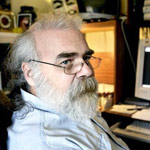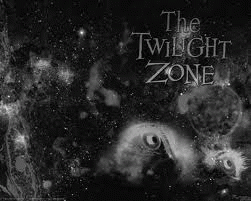There is a fifth dimension, beyond that which is known to man. It is a dimension as vast as space and as timeless as infinity. It is the middle ground between light and shadow, between science and superstition, and it lies between the pit of man's fears and the summit of his knowledge. This is the dimension of imagination. It is an area which we call the Twilight Zone.
Thus intoned Rod Serling at the beginning of the first episode of the first season of The Twilight Zone in 1959. It would be years before I read Kafka, Huxley, and Orwell, but I knew the territory well. Rod Serling, Charles Beaumont, and Richard Matheson had already taken me there once every week for five years.
The Twilight Zone left me with powerful memories of stories of ordinary people who had somehow slipped almost casually across an unseen line, and into another world ... another reality. And here we all are ... 49 years after the last program was broadcast ... living in The Twilight Zone. I wish we had better writers. The same plot devices from a handful of episodes are used over and over; overlap one another, and play simultaneously non-stop. And the kicker is ... most people don't even notice ... and that in itself is an old Twilight Zone episode.
Running simultaneously with that episode is a story whose theme Serling explored many times -- Fascism. The phrase, "... when everyone is transformed, no one is transformed." from Milton Meyer's They Thought They Were Free keeps banging around in my head. Meyer didn't write for television. He wrote history. He wrote about how Germany, a modern, industrialized, educated nation turned to Fascism. He wrote about how "decent men" became Nazis. What he wrote in 1955 has become the reality for post 9/11 America. In case it slipped our notice ... Everything has been transformed.
From Wikipedia:
"The Pentagon Papers, officially titled United States Vietnam Relations, 1945-1967: A Study Prepared by the Department of Defense, is a United States Department of Defense history of the United States' political-military involvement in Vietnam from 1945 to 1967. The papers were discovered and released by Daniel Ellsberg, and first brought to the attention of the public on the front page of The New York Times in 1971. A 1996 article in The New York Times said that the Pentagon Papers 'demonstrated, among other things, that the Lyndon Baines Johnson Administration had systematically lied, not only to the public but also to Congress, about a subject of transcendent national interest and significance.'Thirty-eight years after the leaking of the Pentagon Papers, Chelsea Manning contacted WikiLeaks and released classified information about the United States actions in the Afghanistan and Iraq wars. The material provided by Manning, according to WikiLeaks' founder Julian Assange, "suggest thousands of war crimes."
"Later, Ellsberg said the [classified] documents 'demonstrated unconstitutional behavior by a succession of presidents, the violation of their oath and the violation of the oath of every one of their subordinates.' He added that he leaked the Papers to end what he perceived to be 'a wrongful war.'"
The architects of these war crimes, the instigators of the supreme international crime, a war of aggression, are now highly paid keynote speakers; they write books, and regularly appear on network news programs for their expertise and commentary. Chelsea Manning, on the other hand, has been sentenced to serve 35 years in a military prison.
In 42 years, from the release of The Pentagon Papers to Chelsea Manning's sentencing ... everything has been transformed.
As Meyer wrote...
"...you see that everything, everything, has changed and changed completely under your nose. The world you live in -- your nation, your people -- is not the world you were in at all. The forms are all there, all untouched, all reassuring, the houses, the shops, the jobs, the mealtimes, the visits, the concerts, the cinema, the holidays. But the spirit, which you never noticed because you made the lifelong mistake of identifying it with the forms, is changed. Now you live in a world of hate and fear, and the people who hate and fear do not even know it themselves; when everyone is transformed, no one is transformed."
Occasionally I have a benign Zone-esque moment perhaps brought
on by encroaching geezerhood -- who knows? The dime in the bowl of change
on my nightstand has embossed upon it the face of a living queen instead
of a dead president. An insignificant moment of slight disorientation
quickly passes. I remind myself, "That's a Canadian dime, dummy."
But wouldn't you be absolutely dumbfounded if you found a dime in your
pocket with Woodrow Wilson's profile on it? In what world would you
suddenly have found yourself?
My first exposure to existential angst wasn't Kafka or Jean-Paul Sartre, but the 20-second episode from The Twilight Zone's first season, The Monsters Are Due on Maple Street, which ends with Serling's narration:
"The tools of conquest do not necessarily come with bombs and explosions and fallout. There are weapons that are simply thoughts, attitudes, prejudices -- to be found only in the minds of men. For the record, prejudices can kill. And suspicion can destroy. And a thoughtless, frightened search for a scapegoat has a fallout all its own -- for the children ... and the children yet unborn. And the pity of it is ... that these things cannot be confined ... to the Twilight Zone."
Pretty heavy for an old TV show, huh? As Stephen King wrote in
Danse Macabre, "The Twilight Zone did occasionally strike notes
of horror -- the best of these vibrate in the back teeth years
later."
What do you mean -- "years later"?! Faulkner wrote, "The past is
never dead. It's not even past." The Twilight Zone was
never cancelled ... we're living in it.







